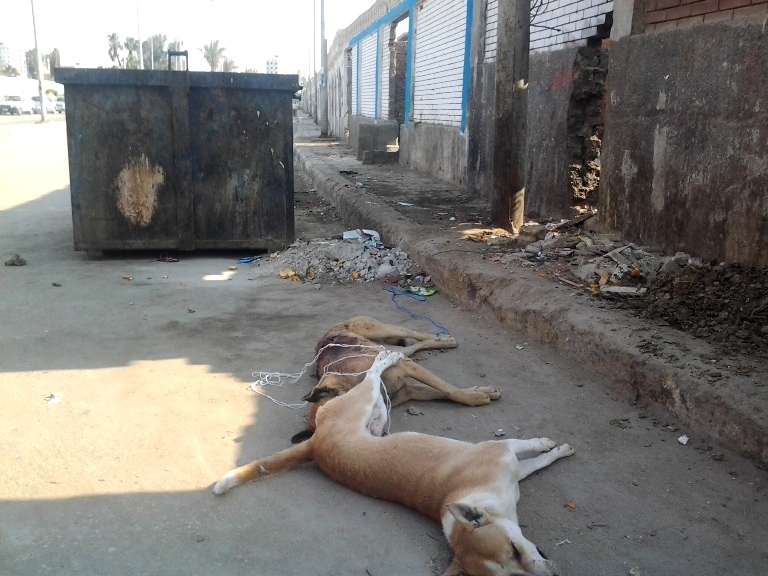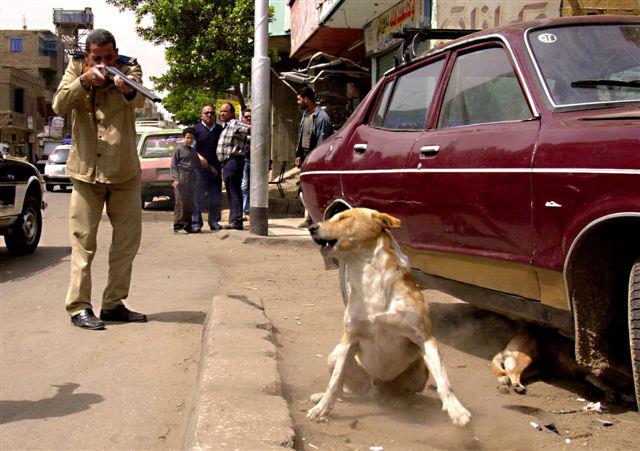His name is Chiko, a five year old who was found in a cemetery. His beautiful golden hair had fallen off, and with little to no food, Chiko could not fight the horrendous infections he had in his eyes and was left with multiple burns on his bare skin. He was frail and weak but had the personality of a devoted angel.
Yet, he was just yet another case of an abandoned, abused, and forgotten dog at ESMA’s (Egyptian Society for Mercy to Animals) shelter.
It was around that time my younger sister was begging my mother to get a dog, and after multiple sit downs and discussions, she finally agreed. A few short days later, Chiko became a part of our family and even though he is a feisty little fellow, we cannot imagine our lives without him.
The reason why I felt the urge to write this article was because no matter where you go or what street you are on, there is always some sort of cruel act directed at an animal by someone. Whether it is kicking or flipping a cigarette at them, it is something that has become so common that it has become the norm. It is the norm to dismiss, injure or physically harm an animal.

In 2007 and early 2013, a mass shooting of stray dogs took place in Egypt. With hundreds of animals dead and their blood left to rot on the streets, the Egyptian government decided to look for other alternatives. Consequently, the government as well as large groups of the Egyptian society has found a ”cleaner” way to eliminate those stray animals by using poison instead. This does not only cause untimely deaths of countless cats and dogs that belong to numerous families and individuals, but it also causes the suffering and incredibly painful deaths of innocent animals.
People have become so egotistical and vain to the point where they do not only dismiss innocent beings that are hurt, but are also actively participating in the harm that is being afflicted on them. Who cares if a cat is kicked so hard it limps away? Why slow the car when a dog is crossing the street? Who cares if a dog is distressed from the heat and is in desperate need of water? It is just an animal at the end of day, right?
People within the animal rights community always hear the same excuses and arguments when they try educating the public on animal rights and welfare. We always get the “when we help the poor we’ll think about the animals” argument, or the ”they’re everywhere and they’re over populated, so what if we kill a few” argument.

These common perceptions need to change for a variety of reasons. For starters, a human life is no greater than a non-human’s life. Life is life, and like human beings, animals have the ability to think and the ability to feel – they have a real comprehensible understanding of feelings on an emotional level. Meaning, like humans, animals can experience negative and positive feelings and are able to develop thoughts and retain memories.
Second of all, killing stray animals is a ridiculous solution to the problem of overpopulation. The human race is over populated so why not just ”kill a few”?
The solution to the over population is to neuter and spay those animals. Multiple well respected veterinary clinics and active members within the Maadi community have come together to resolve the issue without the needless killing of animals, which is how the Maadi TNR Initiative (Trap, Neuter, and Release) was born.
This program is a community based initiative that is not sponsored by the government and is solely run by active members within the Maadi community and veterinarians. The ultimate goal of the Maadi TNR Initiative is help capture stray animals. Veterinarians then neuter/spay them, provide the needed medical care and then release the animals. Perhaps other communities can come up with similar programs or at the very least, take on this one?
There is a common belief among animal rights activists that when you rescue or adopt animals you are rescuing them when, in fact, it is the opposite that is true – you are the one that ends up being rescued. Letting go of the social stigma that accompanies stray animals is another needed change.
Rather than buying animals from pet shops and breeders, visit shelters and adopt instead. After all, if you are looking to include a family member or welcome an addition to your family, the breed of the animal you are rescuing should not be a factor in your decision making process. You are rescuing a soul not buying an expensive watch.

Educational reform is an initial factor and if focused on, animal rights in this country will actually be addressed. Children are tender and instinctively compassionate and curious about all living beings around them.
Yet, at a young age, we disconnect those feelings by allowing them to see the disturbing slaughter of animals and encourage them to play with the blood of what was, a few seconds ago, a breathing, living life. Therefore, they grow up to be disconnected, apathetic and oblivious to anything else that is not a human being.
ESMA is currently running campaigns to try to change that perception in our youth. They’re going to schools and enabling children to once again connect with animals and see how innocent and harmless they really are.
The public as well must take on a similar approach to animals and let go of the common fear that all stray cats and dogs are diseased and are bound to hurt us. Rather than being so hell bent on getting rid of them, why not strive to help them?
Many shelters, like ESMA, are now closed and can only accept urgent cases due to the lack of funding and resources because they have no sponsors or endorsements from the government, major companies or corporations, and as a result, they rely merely on public donations and support.
For this reason, we cannot neglect and overlook a problem that is undeniably clear and existent in our society only because the targets of the problem belong to a different species than us. Non-human species are at the mercy of human beings – they are not inferior, they are only different than us and that does not and should not diminish their rights.




Comments (25)
Although I do not agree with the poisoning or shooting of these strays I do agree that culling is necessary. Dogs left to roam will form packs and in time will attack people. If rabies should occur then there is a great risk especially to children. Dogs are scavengers and will live near rubbish spreading filth and disease, cats are at least useful because they will keep down the rats but even they can become a problem if not controlled. It is hard to see starving and sick animals on the streets so why not ease their pain by killing them humanely? There should be strict controls on pet owners and where they can purchase an animal, and why not sell the animal, dog or cat already neutered? There is too much sentimentality about animals. I abhor cruelty to any animal, but humans come first, so let’s clean up our streets of strays but in a less severe way.
Dogs do not attack unless they feel threatened, even when in packs. Yes the more of them together the more they will bark as what they see as threats, but dogs just like cats only respond to humans in the way humans have treated them. Culling them is not really a solution, as you will never be able to eradicate the problem unless you intend to (try) and exterminate the entire population. Good luck with that. The problem here is cultural – officially government doesn’t really have a policy on animal welfare and so humans (who are the cause of the problem) buy cute little puppies because they think they look nice, then the moment a veterinary bill needs to be paid or the family gets too big, the dog gets thrown out on the street. Un-neutered. Its the same story with cats. When people do decide they would like a pet (for all the wrong reasons) they want to buy a breeded (designer) animal from a pets shop. They don’t get them vaccinated. They don’t get them neutered. Eventually they get bored or refuse the responsibility that comes with owning a pet and instead of trying to find a new home, they throw the animal out onto the street. While they have the pet, they allow it to go out and mate with the street population creating further pressure on the problem. So, The solution here is not to go and cull them while humans are still being the main contributors to the problem. And for such a religious country it is shocking and sickening to see first hand the disgusting state of affairs when it comes to these poor animals. Like he author pointed out, the humans are far more overpopulated in this country and obviously ‘culling’ the excess poor people on the street would obviously not be a viable solution. So why is it acceptable for cats or dogs? because they are a lower form of life? They think, they feel, they have emotions, they have needs, the form bondships. Humans are the problem here with big cultural attitudes and stupid, silly superstitions which is claimed to be from religion where most muslim scholars will tell you the Koran teaches the same as the bible – humans have a responsibility to gods ‘lesser’ beasts on this planet. Sort out the human population with it’s hypocrisy and selfishness and then the problem on the street with animals would noticeably start to decline
Great article. I’m ashamed to say that I have at one point used the “When humans are getting their rights we’ll worry about animals”, but it kind of goes hand in hand.
Neutering the animals sounds like a great and very simple solution the problem. Might be a good idea to include a link to their facebook group (at least I think this is the one https://www.facebook.com/TNRMaadi ) so they can reach more people and more communities may take this up.
Also, one small typo: “multiple burns on his bear skin”.